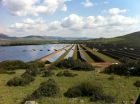(Press-News.org) ANN ARBOR--Whether you're baking bread or building an organism, the key to success is consistently adding ingredients in the correct order and in the right amounts, according to a new genetic study by University of Michigan researchers.
Using the baker's yeast Saccharomyces cerevisiae, Patricia Wittkopp and her colleagues developed a novel way to disentangle the effects of random genetic mutations and natural selection on the evolution of gene expression. Their findings are scheduled for online publication in the journal Nature on March 16.
"These results tell us that the effects of mutations available for natural selection to act on can play a large role in how an organism evolves. The approach we developed allows us to test what those influences are and to better understand how evolution works," said Wittkopp, an associate professor in the U-M Department of Ecology and Evolutionary Biology and in the Department of Molecular, Cellular and Developmental Biology.
The first authors of the Nature paper are EEB graduate student Brian Metzger and former MCDB graduate student David Yuan.
In their study, the U-M researchers used the TDH3 gene, which helps baker's yeast cells convert sugar into energy used for growth. To understand how different genetic mutations impact TDH3 expression, they systematically changed each of the DNA base pairs in a region of the gene known as the promoter, which controls the amount of the gene that is expressed.
They created all of the different possible genetic mutations in this region and measured the change in gene expression caused by each mutation.
"Surprisingly, we found that most mutations didn't change the average expression of TDH3 but instead changed how variable TDH3 expression was among genetically identical cells," Wittkopp said.
"It would be as if you changed the recipe for a loaf of bread in a way that didn't change the average quality of the bread but instead caused individual loaves to be unpredictably good or bad," Metzger said.
The researchers then surveyed natural yeast strains to see which of the many genetic "recipes" the yeast actually use in the wild.
"We found that versions of the sequence controlling TDH3 expression that increased variance in gene expression were rarely found in the wild, indicating that natural selection prefers TDH3 expression to be consistent, resulting in similar amounts of gene product in every cell," Metzger said.
The experiments showed that natural selection can act not only on the level of gene expression but also on the consistency of expression. This consistency of gene expression, known as expression noise, affects evolutionary fitness by altering the chance that a given cell has the most advantageous amount of a gene product.
"Measuring the effects of new mutations provides a critical, but typically missing, piece of the evolutionary puzzle," Wittkopp said. "This study shows how knowledge of what can happen to traits in the absence of selection provides novel insight into the evolutionary processes that give rise to genetic differences observed in the wild."
INFORMATION:
Other authors of the Nature paper are Jonathan Gruber and Fabien Duveau of the U-M Department of Ecology and Evolutionary Biology. Funding for the work was provided by the March of Dimes, Alfred P. Sloan Research Foundation, National Science Foundation, National Institutes of Health and U-M.
Patricia Wittkopp
Brian Metzger
Department of Ecology and Evolutionary Biology
Department of Molecular, Cellular and Developmental Biology
A new study from the University of Birmingham and the MRC Cognition and Brain Sciences unit in Cambridge has shown how intentional recall is beyond a simple reawakening of a memory; and actually leads us to forget other competing experiences that interfere with retrieval. Quite simply, the very act of remembering may be one of the major reasons why we forget.
The research, published today in Nature Neuroscience, is the first to isolate the adaptive forgetting mechanism in the human brain. The brain imaging study shows that the mechanism itself is implemented by the suppression ...
The largest genetic study of tuberculosis (TB) susceptibility to date has led to a potentially important new insight into how the pathogen manages to evade the immune system. Published today in the journal Nature Genetics, the study advances understanding of the biological mechanisms involved in TB, which may open up new avenues to design efficient vaccines for its prevention.
TB, caused by infection with the pathogen Mycobacterium tuberculosis, is a major global public health problem. According to the World Health Organization, in 2013 nine million people fell ill with ...
A Venezuelan evolutionary biologist and a US zoologist state that they have refuted, through mitochondrial DNA sequencing, a recent claim, also based on such sequencing, that unknown type of bear must exist. in the Himalayas and that it may be, at least in part, the source of yeti legends. Their study was published in the open access journal ZooKeys.
Last year, B. Sykes and co-authors, in the course of mitochondrial DNA sequencing identification of hair samples that had been attributed to "anomalous primates" (yetis, bigfoots, and others), claimed to have found that ...
Berkeley -- Hard-wiring beetles for radio-controlled flight turns out to be a fitting way to learn more about their biology. Cyborg insect research led by engineers at the University of California, Berkeley, and Singapore's Nanyang Technological University (NTU) is enabling new revelations about a muscle used by beetles for finely graded turns.
By strapping tiny computers and wireless radios onto the backs of giant flower beetles and recording neuromuscular data as the bugs flew untethered, scientists determined that a muscle known for controlling the folding of wings ...
In the face of global climate change, increasing the use of renewable energy resources is one of the most urgent challenges facing the world. Further development of one resource, solar energy, is complicated by the need to find space for solar power-generating equipment without significantly altering the surrounding environment.
New work from Carnegie's Rebecca R. Hernandez (now at University of California Berkley), Madison K. Hoffacker, and Chris Field found that the amount of energy that could be generated from solar equipment constructed on and around existing infrastructure ...
Northwestern University scientists have developed a robust new material, inspired by biological catalysts, that is extraordinarily effective at destroying toxic nerve agents that are a threat around the globe. First used 100 years ago during World War I, deadly chemical weapons continue to be a challenge to combat.
The material, a zirconium-based metal-organic framework (MOF), degrades in minutes one of the most toxic chemical agents known to mankind: Soman (GD), a more toxic relative of sarin. Computer simulations show the MOF should be effective against other easy-to-make ...
"Warmer air transports more moisture and hence produces more precipitation - in cold Antarctica this takes the form of snowfall," lead author Katja Frieler from the Potsdam Institute for Climate Impact Research (PIK) explains. "We have now pulled a number of various lines of evidence together and find a very consistent result: Temperature increase means more snowfall on Antarctica," says Frieler. "For every degree of regional warming, snowfall increases by about 5 percent." Published in the journal Nature Climate Change, the scientists' work builds on high-quality ice-core ...
Researchers have discovered a valley underneath East Antarctica's most rapidly-changing glacier that delivers warm water to the base of the ice, causing significant melting.
The intrusion of warm ocean water is accelerating melting and thinning of Totten Glacier, which at 65 kilometres long and 30 kilometres wide contains enough ice to raise global sea levels by 3.5 metres. The glacier is one of the major outlets for the East Antarctic Ice Sheet, which is the largest mass of ice on Earth and covers 98 percent of the continent.
Climate change is raising the temperature ...
CORVALLIS, Ore. - A new study confirms that snowfall in Antarctica will increase significantly as the planet warms, offsetting future sea level rise from other sources - but the effect will not be nearly as strong as many scientists previously anticipated because of other, physical processes.
That means that many computer models may be underestimating the amount and rate of sea level rise if they had projected more significant impact from Antarctic snow.
Results of the study, which was funded by the National Science Foundation, were reported this week in the journal ...
About one quarter of the global seafloor is extremely nutrient poor. Contrary to previous assumptions, it contains oxygen not just in the thin surface layer, but also throughout its entire thickness. The underlying basement rocks contain oxygen as well. An international research team made these new discoveries through analysis of drill cores from the South Pacific Gyre.
In the latest issue of Nature Geoscience the scientists also point out the potential effects on the composition of Earth's interior because oxygen-containing deep-sea sediment has a different mineral composition ...

